

AdWords: Keyword Planner. Site map. URL list. Read More Link. Custom Breadcrumbs. Custom Breadcrumbs 2 (6.x-2.x and 7.x-2.x) Many new features have been added including support for Views, Panels, Taxonomy vocabularies and terms, paths, and a simple API that allows contributed modules to enable custom breadcrumbs for module pages and theme templates.
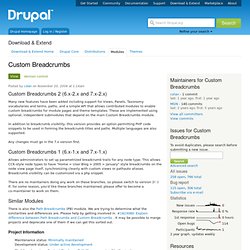
These are implemented using optional, independent submodules that depend on the main Custom Breadcrumbs module. Footermap: a footer site map. Generates a site map as a block placed in the footer region by default.
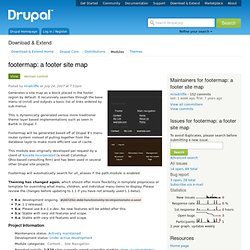
It recursively searches through the base menu id (mlid) and outputs a basic list of links ordered by sub-menus. This is dynamically generated versus more traditional theme layer based implementations such as seen in Bartik in Drupal 7. Footermap will be generated based off of Drupal 8's menu router system instead of pulling together from the database layer to make more efficient use of cache. Taxonomy Title. This module was designed to update the heading tag at the top of the taxonomy term page.
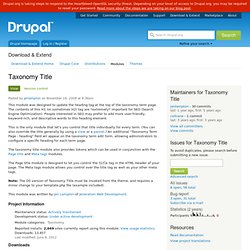
The contents of this H1 (or sometimes H2) tag are *extremely* important for SEO (Search Engine Optimization). People interested in SEO may prefer to add more user-friendly, keyword-rich, and descriptive words to this heading element. Path redirect. Scheduler. Scheduler gives content editors the ability to schedule nodes to be published and unpublished at specified dates and times in the future.
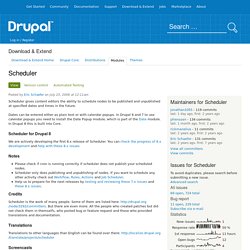
Dates can be entered either as plain text or with calendar popups. In Drupal 6 and 7 to use calendar popups you need to install the Date Popup module, which is part of the Date module. In Drupal 8 this is built into Core. Scheduler for Drupal 8. Mollom. Mollom is an intelligent content moderation web service.
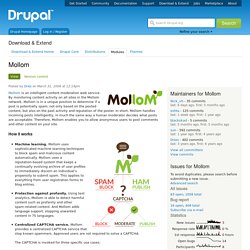
By monitoring content activity on all sites in the Mollom network, Mollom is in a unique position to determine if a post is potentially spam; not only based on the posted content, but also on the past activity and reputation of the poster. In short, Mollom handles incoming posts intelligently, in much the same way a human moderator decides what posts are acceptable.
Therefore, Mollom enables you to allow anonymous users to post comments and other content on your site. How it works Machine learning. Mollom audits the content quality by defining it across three dimensions: Spam, Ham, and Unsure: Google Analytics. TagCloud. This module Provides a TagCloud and List of Tags.
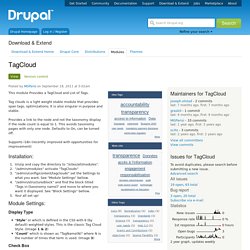
Tag clouds is a light weight stable module that provides span tags, optimizations; It is also singular in purpose and stable. Provides a link to the node and not the taxonomy display if the node count is equal to 1. This avoids taxonomy pages with only one node. Defaults to On, can be turned off. Supports i18n (recently improved with opportunities for improvement) Installation: Unzip and copy the directory to "/sites/all/modules". " Module Settings: Display Type "Style" or which is defined in the CSS with 6 (by default) weighted styles. Check Box. HTML Purifier. Site verification. This module assists with the site/domain ownership authentication/verification for search engines.
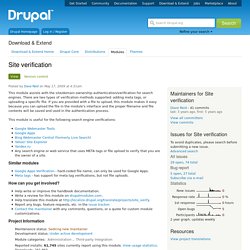
There are two types of verification methods supported: adding meta tags, or uploading a specific file. If you are provided with a file to upload, this module makes it easy because you can upload the file in the module's interface and the proper filename and file contents will be saved and used in the authentication process. This module is useful for the following search engine verifications: Similar modules Google Apps Verification - hard-coded file name, can only be used for Google Apps.Meta tags - has support for meta tag verifications, but not file uploads.
How can you get involved? XML sitemap. The XML sitemap module creates a sitemap that conforms to the sitemaps.org specification.
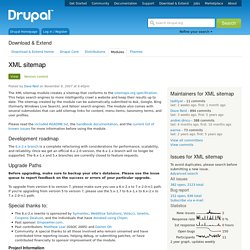
This helps search engines to more intelligently crawl a website and keep their results up to date. The sitemap created by the module can be automatically submitted to Ask, Google, Bing (formerly Windows Live Search), and Yahoo! SEO Compliance Checker. The SEO Compliance Checker checks node content on search engine optimization upon its creation or modification.
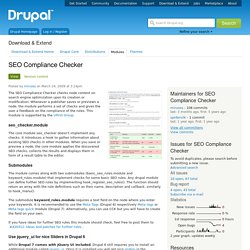
Menu attributes. SEO Tools. The Drupal SEO Tools module seamlessly integrates a sophisticated all-in-one suite of search engine reporting, analysis and optimization tools into your website.
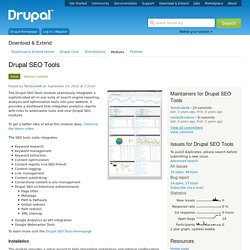
It provides a dashboard that integrates analytics reports with links to webmaster tools and vital Drupal SEO modules. To get a better idea of what this module does, checkout the demo video The SEO tools suite integrates: Keyword researchKeyword managementKeyword extractionContent optimizationContent reports (via SEO Friend)Content taggingLink managementContent autolinkingCornerstone content & silo managementDrupal SEO architectural enhancementsPage titles MetatagsPath & PathautoGlobal redirectPath redirectXML sitemapGoogle Analytics w/ API integrationGoogle Webmaster Tools To learn more visit the Drupal SEO Tools Homepage Installation.
SEO Checklist. Drupal SEO Checklist - What is it? The Drupal SEO Checklist uses Drupal SEO best practices to check your website for proper search engine optimization. It eliminates guesswork by creating a functional to-do list of modules and tasks that remain. Updated regularly with the latest techniques, it makes on-page Drupal search engine optimization hassle-free. It breaks the tasks down into functional needs like Title Tags, Paths, Content and many more. Content Optimizer. Global Redirect. Redirect. Search 404. Pathauto. The Pathauto module automatically generates URL/path aliases for various kinds of content (nodes, taxonomy terms, users) without requiring the user to manually specify the path alias. This allows you to have URL aliases like /category/my-node-title instead of /node/123. The aliases are based upon a "pattern" system that uses tokens which the administrator can change.
Requirements Token Versions. Metatag. Page Title. The word "title" is a bit overloaded. Every piece of content in Drupal has a title, and so does every page. The page title is the one found in the HTML head inside the <title> tag. It is also used on SERPs (Search Engine Result Pages) and can greatly enhance your websites SEO (Search Engine Optimization).